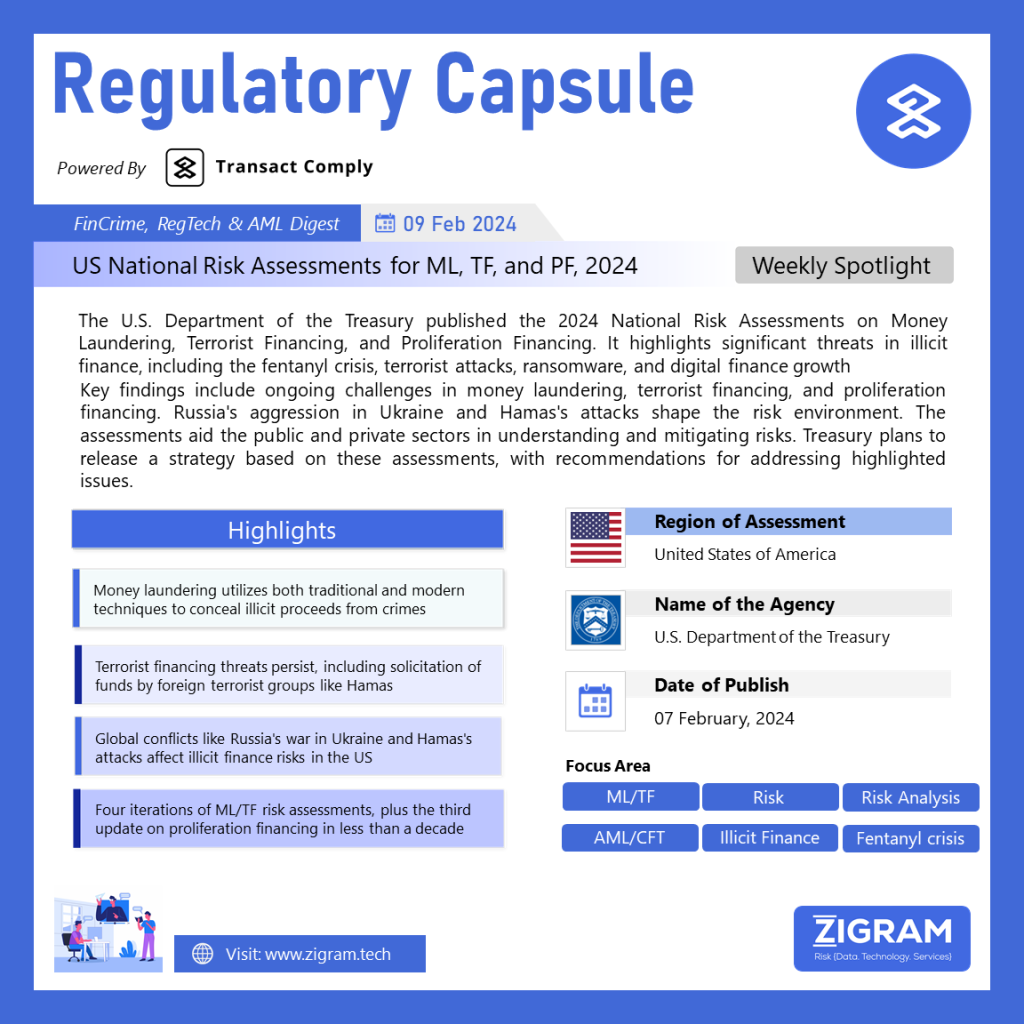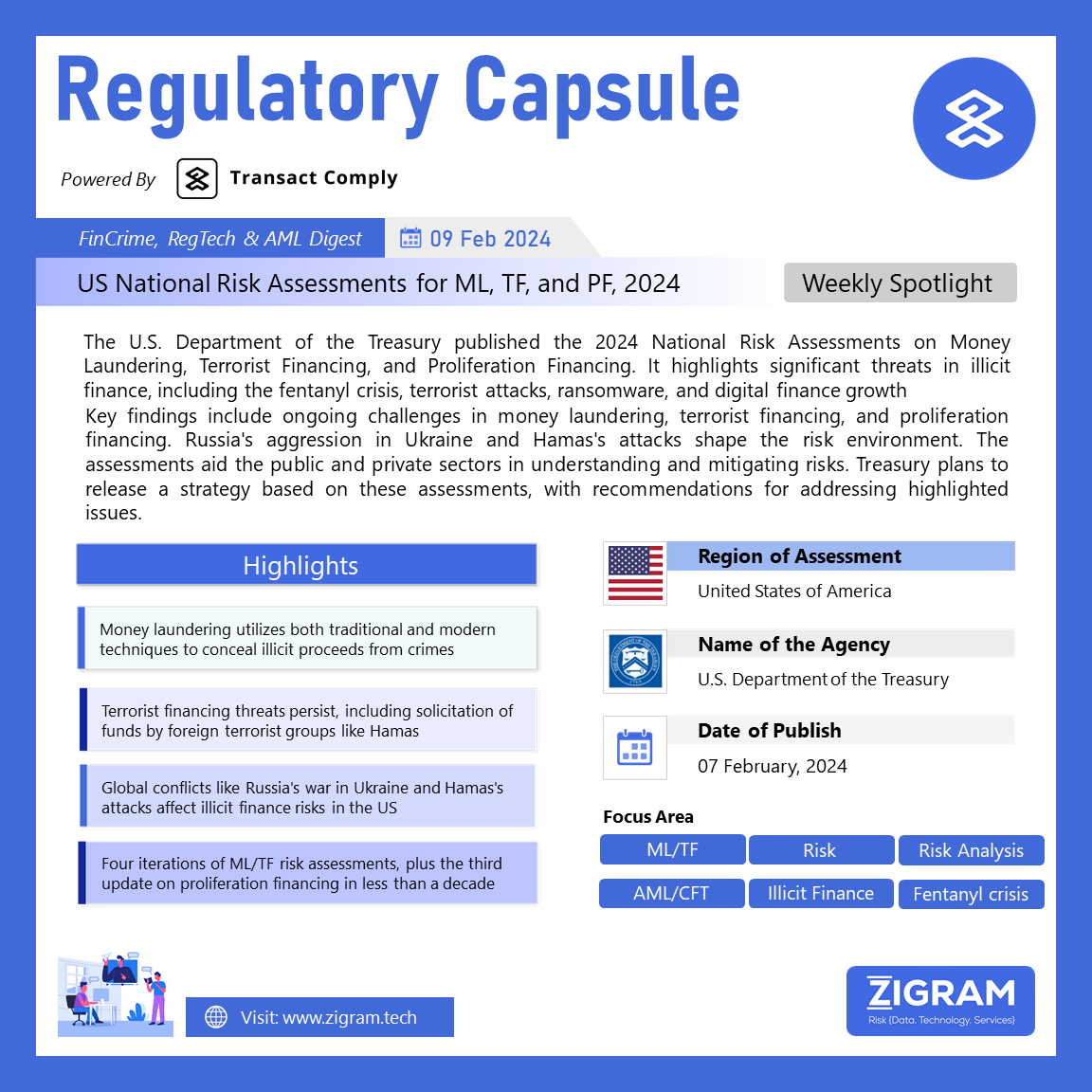Published Date:
Regulation Name:National Risk Assessments for Money Laundering, Terrorist Financing, and Proliferation Financing 2024
Regulatory Update Date: 07 February 2024
Country: United States of America
Agency: U.S Department of Treasury
The U.S. Department of the Treasury has issued its 2024 National Risk Assessments on Money Laundering, Terrorist Financing, and Proliferation Financing, offering crucial insights into the evolving landscape of illicit finance threats facing the United States. These assessments, representing the fourth iteration of money laundering and terrorist financing risk assessments and the third update of the proliferation financing risk assessment in less than a decade, shed light on significant challenges and vulnerabilities in the nation’s financial system.
One of the primary findings of the reports is the multifaceted nature of money laundering, with criminals employing a variety of traditional and innovative techniques to move and conceal illicit proceeds. Major crimes fueling money laundering include fraud, drug trafficking, cybercrime, human trafficking, and corruption. The assessments underscore persistent and emerging risks such as the misuse of legal entities, lack of transparency in certain real estate transactions, inadequate coverage of anti-money laundering/countering the financing of terrorism (AML/CFT) regulations in certain sectors like investment advisers, complicit merchants and professionals, and weaknesses in compliance or supervision at some regulated financial institutions.
Regarding terrorist financing, the United States faces a diverse array of threats from both foreign and domestic actors. The reports highlight the ongoing challenges posed by individuals soliciting funds for or attempting to send funds to foreign terrorist groups, often utilizing cash, registered money services businesses, or virtual assets. Notably, the assessment delves into Hamas’s exploitation of the international financial system, including its solicitation of funds from donors worldwide. Additionally, the rise of domestic violent extremist movements presents an elevated threat, posing challenges for law enforcement agencies tasked with countering such threats.
In terms of proliferation financing, Russia and the Democratic People’s Republic of Korea (DPRK) have emerged as significant concerns since the previous assessment. Russia’s unlawful actions in Ukraine have been accompanied by efforts to illegally acquire U.S.-origin goods with military applications, employing obfuscation techniques such as front companies and transshipment points. Similarly, networks associated with the DPRK are increasingly leveraging the digital economy, including hacking virtual asset service providers and deploying fraudulent information technology workers overseas.
The assessment process was led by the Treasury’s Office of Terrorist Financing and Financial Crimes, in close coordination with various offices and bureaus across the Department, law enforcement and regulatory agencies, federal functional regulators, as well as the intelligence and diplomatic communities. The forthcoming 2024 National Strategy for Combatting Terrorist and Other Illicit Finance will provide strategic recommendations informed by the analysis contained in these risk assessments. This feedback loop has been instrumental in identifying and addressing illicit finance risks, contributing to enhancements in the AML/CFT regime, including the implementation of the beneficial ownership reporting requirement and forthcoming proposed rules aimed at addressing vulnerabilities in the residential real estate sector and certain investment advisers.
Overall, the 2024 National Risk Assessments serve as vital tools for stakeholders in both the public and private sectors, enabling a deeper understanding of the current illicit finance environment and informing more effective risk mitigation strategies in the ongoing fight against money laundering, terrorist financing, and proliferation financing threats.
- #USDepartmentofTreasury
- #NationalRiskAssessments
- #MoneyLaundering
- #TerroristFinancing
- #ProliferationFinancing
- #IllicitFinanceThreats
- #AML
- #CFT
- #FinancialSecurity
- #RiskMitigation
- #LawEnforcement
- #RegulatoryCompliance


